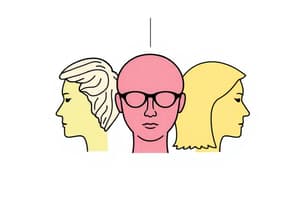Podcast
Questions and Answers
Flashcards
Personality
Personality
A set of characteristics (thinking, feeling, behaving) that distinguishes us from others and leads us to act consistently across situations.
Openness
Openness
Daring, non-conforming, and imaginative.
Conscientiousness
Conscientiousness
Ethical, dependable, productive, and purposeful.
Extroversion
Extroversion
Signup and view all the flashcards
Agreeableness
Agreeableness
Signup and view all the flashcards
Neuroticism
Neuroticism
Signup and view all the flashcards
Personality Disorder
Personality Disorder
Signup and view all the flashcards
Cognition
Cognition
Signup and view all the flashcards
Affect
Affect
Signup and view all the flashcards
Cluster A
Cluster A
Signup and view all the flashcards
Cluster B
Cluster B
Signup and view all the flashcards
Cluster C
Cluster C
Signup and view all the flashcards
Paranoid Personality Disorder
Paranoid Personality Disorder
Signup and view all the flashcards
Schizoid Personality Disorder
Schizoid Personality Disorder
Signup and view all the flashcards
Schizotypal Personality Disorder
Schizotypal Personality Disorder
Signup and view all the flashcards
Antisocial Personality Disorder
Antisocial Personality Disorder
Signup and view all the flashcards
Borderline Personality Disorder
Borderline Personality Disorder
Signup and view all the flashcards
Histrionic Personality Disorder
Histrionic Personality Disorder
Signup and view all the flashcards
Narcissistic Personality Disorder
Narcissistic Personality Disorder
Signup and view all the flashcards
Avoidant Personality Disorder
Avoidant Personality Disorder
Signup and view all the flashcards
Dependent Personality Disorder
Dependent Personality Disorder
Signup and view all the flashcards
Obsessive-Compulsive Personality Disorder
Obsessive-Compulsive Personality Disorder
Signup and view all the flashcards
DBT
DBT
Signup and view all the flashcards
Study Notes
- Personality is a set of characteristics that include thinking, feeling, and behaving, distinguishing individuals and promoting consistent actions across situations.
- Personality encompasses unique characteristics influencing behaviors, emotions, thoughts, and interactions.
The Big Five Personality Dimensions
- Openness (to experience): Daring, non-conforming, imaginative.
- Conscientiousness: Ethical, dependable, productive, purposeful.
- Extroversion: Talkative, sociable, fun-loving, affectionate.
- Agreeableness: Sympathetic, warm, trusting, cooperative.
- Neuroticism: Anxious, insecure, guilt-prone, self-conscious.
Personality Disorders Defined (DSM-5-TR)
- An enduring pattern of inner experience and behavior that deviates markedly from cultural norms.
- Personality disorders are pervasive and inflexible, with onset in adolescence or early adulthood, stable over time, and causing distress or impairment.
Manifestations of Personality Disorders
- Involve two or more of the following:
- Cognition
- Affect
- Interpersonal functioning
- Impulse control
- They are not a consequence of another mental disorder or attributable to a substance or medical condition.
Personality Disorder Clusters
- Characterized by 10 personality disorders grouped into three descriptively similar clusters:
- Cluster A: "Odd or eccentric"
- Cluster B: "Dramatic, emotional, or erratic"
- Cluster C: "Anxious or fearful"
Cluster A: "Odd or Eccentric"
- Includes the personality disorders:
- Paranoid
- Schizoid
- Schizotypal
Paranoid Personality Disorder
- Pervasive distrust and suspiciousness of others' motives, interpreting them as malevolent.
- Individuals are perceived as Deceptive and exploitive
- Are considered Untrustworthy
- Sexual partner is not faithful
- Individuals are often quarrelsome, stubborn, and rigid.
Schizoid Personality Disorder
- Pervasive detachment from social relationships and a restricted range of emotional expression.
- There is neither desire to enjoy close relationships.
- People choose solitary activities.
- People have little to no interest in sexual relationships, and enjoy few to any activities.
- People lack close friends and confidants
- This disorder is characterized by people seeking jobs that require little to no contact with others, possibly living alone.
- They exhibit weak social skills and they are generally unaffected by praise or criticism.
- People rarely show feelings, exhibiting neither joy nor anger and often appear cold, humorless, and dull.
Schizotypal Personality Disorder
- Pervasive social and interpersonal deficits: acute discomfort with reduced capacity for close relationships.
- Cognitive or perceptual distortions and eccentricities of behavior are key features.
- People seek isolation, choose undemanding jobs with little interaction, and emotions may be inappropriate, flat, and humorless.
- Individuals have attention deficits and their speech may be digressive or vague.
- Delusions that unrelated events pertain to them in some meaningful way.
- Odd beliefs and magical thinking are common.
- Unusual perceptual experiences, odd thinking/speech, suspiciousness/paranoid ideation.
Associated Factors
- Psychodynamic factors include early interactions with demanding or abusive parents, repeated mistreatment, lack of love, and family conflicts.
- Cognitive-behavioral factors include holding broad maladaptive assumptions and inaccurate perceptions.
Schizotypal PD factors
- Twin studies suggest possible genetic links
- Schizotypal PD has many similarities to schizophrenia.
- Deficits in attention and working memory are noted.
- Biological factors include dopamine activity, enlarged ventricles, smaller temporal lobes, and reduced gray matter, all with a possible genetic basis.
- There may be a close relationship with depressive and bipolar disorders.
Treatment cluster A
- Few people seek or attend willingly, and are notably resistant.
- Success is sometimes found with group therapy if social support is given and attendance occurs.
- CBT, object-relations therapy, and social skills training can be implemented.
Cluster B: "Dramatic, Emotional, or Erratic"
- Includes the personality disorders:
- Antisocial
- Borderline
- Histrionic
- Narcissistic
Antisocial Personality Disorder
- Pervasive disregard for and violation of the rights of others, occurring since age 15, in an individual at least 18 years old.
- There must be evidence of Conduct Disorder with onset before age 15.
- There is a lack of a moral conscience, sometimes labeled "psychopath" or "sociopath".
- There is a high incidence among incarcerated individuals, those with substance abuse disorders, and those with gambling disorders.
- There is frequent behavior unlawfully, lying, use of aliases, and conning others for profit or pleasure
Antisocial Personality Disorder
- There exhibits an Impulsiveness with a failure to plan ahead
- Irritability, aggression, fights, assaults.
- There is reckless disregard for safety.
- Irresponsible in work behavior and financial obligations.
- There is a Lack of remorse
Borderline Personality Disorder
- Pervasive instability of interpersonal relationships, self-image, and affects.
- impulsivity is common.
- Frantic efforts to avoid real or imagined abandonment are key features.
- Unstable/intense interpersonal relationships alternate between idealization and devaluation ("Splitting").
- There is unstable self-image or sense of self, and potentially self-damaging impulsivity.
Borderline Personality Disorder Part 2
- Includes suicide and being Recurrent suicidal behavior with self-Mutilartion
- Has an instable and intense Affect
- Episodes include: dysphoria, irritability, anxiety
- There is Chronic emptiness
- Has Inappropriate Intense emotions like anger or outbursts.
- There are stress-related paranoid ideations or severe dissociative symptoms.
Histrionic Personality Disorder
- Pervasive excessive emotionality with attention-seeking behavior who
- Are Uncomfortable when not the center of attention
- Interactions are often inappropriate or sexually seductive.
- Rapidly shifting and shallow emotional expressions.
- They Use physical traits to be noticed.
- Speech excessively being impressionistic and lacking in detail
- Express Dramatic, theatrical, exaggerated emotional expressions
- Are Suggestible and easily influenced by others or circumstances
- Considers relationships to be more intimate than they actually are
Narcissistic Personality Disorder
- Pervasive grandiosity (in fantasy or behavior), a need for admiration, and a lack of empathy.
- They have grandiose self-importance and exaggerate achievements/talents.
- Express recognition as superior w/o foundation
- They believe in grand fantasies of exaggerated successes
- They believe that they are above others and can be associated with high class/status
Associated Factors For cluster B
- Psychodynamic factors include a History of poverty, abuse and neglect.
- Cognitive and Biological factors include operant conditioning that develop into manipulative tendencies.
Biological Factors
- High concordance with twins
- Lowered serotonin levels
- Also dysfunctional brain structure
Socio-Cultural Factors
- Western cultures can exacerbate narcissistic traits from an early age
Treatment Cluster B
- Is Typically ineffective without a conscious from lack of commitment
- Few seek help either willingly or unwillingly
- Dialectical Behavior therapy has shown tremendous results that is structured from therapists sucha as Martha Linehan
Cluster C: "Anxious or Fearful"
- Includes:
- Avoidant
- Dependent
- Obsessive compulsive
Avoidant Personality Disorder
- Is known to have Pervasive social inhibition and have feeling of inadequacy
- Hypersensitive and negative to others actions
- Avoids work to not risk of dissaproval or discomfort
- They fear intamacy and intimacy
- They pre occupied with being criticized.
Dependent PD
- The person has an extreme need to be taken care off and become clinging and submissive for attention and acceptance
- They cannot stand to be alone
- Uncomfortable or helpless when alone
- Urgently seeks another relationship for care and support when a close relationship ends
OCPD (Obsessive Compulsive Personality Disorder)
- The person is pervasive with oderliness
- Pre occupied with list, rules and details
- perfectionist
- Excessively in love with their work and productivity
- Puts aside friends and any activity that they can do
Associated Factors For Anxious PD
- The persons had shame as children that lead to believe that they are inferior to their peer due to unresolved trauma and abandonment issues.
Treatment For Anxious PD's
- Want acceptance and affection; develop trust to avoid fear or rejection
- Focuses on developing social skills and therapy
- Group formats is best too work on these behaviors
- Anxiolytics and antidepressants have been beneficial
Treatment for dependent PD
- The person shift responsibility upon the therapist
- CBT and assertiveness has improved patients state of mind
- Group practices show significant improvement
Treatment for OCPD
- The person believe that they will fail so they resist to seek help but CBT and structured thinking can assist in fixing the mentality
Studying That Suits You
Use AI to generate personalized quizzes and flashcards to suit your learning preferences.



